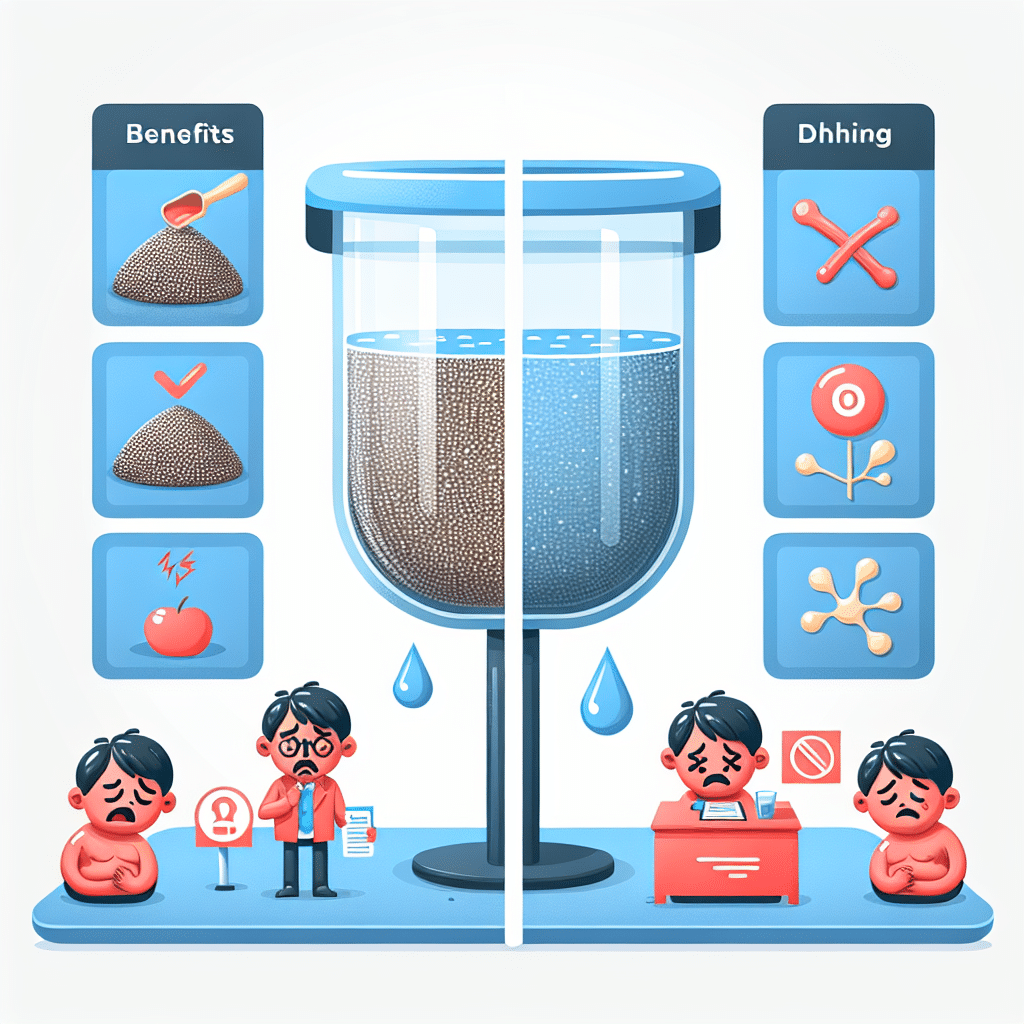Are There Any Negative Effects Of Chia Seeds?
-
Table of Contents
Negative Effects of Chia Seeds: Understanding the Risks

Chia seeds have gained immense popularity in the health food scene over the past few years. Touted for their high fiber, omega-3 fatty acids, and protein content, they are often considered a superfood. However, as with any dietary supplement or food, it is essential to understand that there can be too much of a good thing. This article explores the potential negative effects of chia seeds and provides insights into their safe consumption.
Potential Digestive Issues
Chia seeds are rich in dietary fiber, which is beneficial for digestive health. However, consuming them in large amounts can lead to adverse effects such as:
- Bloating and Gas: The high fiber content can cause bloating and gas, especially if your body is not used to such a fiber-rich diet.
- Constipation or Diarrhea: While fiber can help with regular bowel movements, an excess can lead to constipation or, conversely, diarrhea if the seeds are not taken with enough water.
Interactions with Medications
Chia seeds can interact with certain medications, potentially altering their effectiveness:
- Blood Thinners: Chia seeds are high in omega-3 fatty acids, which can thin the blood. This could amplify the effects of blood-thinning medications, leading to an increased risk of bleeding.
- Diabetes Medications: Due to their ability to lower blood sugar levels, chia seeds might enhance the effects of diabetes medications, necessitating a dosage adjustment.
- High Blood Pressure Medications: Similarly, chia seeds can lower blood pressure, potentially causing an additive effect with high blood pressure medications.
Allergic Reactions
Though rare, some individuals may experience allergic reactions to chia seeds, which can include:
- Skin rashes
- Watery eyes
- Difficulty breathing
Those with a history of allergies to sesame or mustard seeds may be at a higher risk for a chia seed allergy.
Choking Hazard
Chia seeds have the unique ability to absorb water and swell to many times their original size. If consumed dry and not pre-soaked, they can expand in the esophagus and cause a blockage, posing a choking hazard, particularly for people with difficulty swallowing.
Weight Gain
Despite being a staple in many weight loss diets, chia seeds are calorie-dense. Overconsumption without proper dietary adjustments can lead to weight gain:
- One ounce (about 28 grams) of chia seeds contains approximately 138 calories.
- They should be consumed in moderation as part of a balanced diet.
Nutritional Imbalances
Excessive consumption of chia seeds could potentially lead to an imbalance of nutrients:
- Omega-6 Fatty Acids: While chia seeds contain beneficial omega-3 fatty acids, they also have omega-6 fatty acids. An imbalance in the omega-3 to omega-6 ratio can contribute to inflammation.
- Alpha-Linolenic Acid: Chia seeds are rich in ALA, a type of omega-3 fatty acid. However, some studies suggest that high levels of ALA may be associated with prostate cancer risk.
Conclusion: Moderation is Key
The negative effects of chia seeds are generally associated with overconsumption. When consumed in moderation and as part of a balanced diet, chia seeds can offer numerous health benefits. It is crucial to start with small amounts and ensure adequate water intake to prevent digestive issues. Additionally, individuals on medication or with a history of allergies should consult with a healthcare provider before incorporating chia seeds into their diet.
For those looking to enhance their diet with protein and other nutrients, ETprotein offers a range of high-quality, organic protein products that can be a great addition to a healthy lifestyle.
Explore ETprotein’s High-Quality Protein Products
If you’re interested in incorporating more plant-based proteins into your diet, ETprotein’s product line is worth considering. Their offerings include a variety of organic proteins such as rice, pea, and seed-based proteins that are non-GMO and allergen-free. With a neutral taste and high purity levels, these proteins are suitable for various applications, from sports nutrition to health and wellness products.
ETprotein’s commitment to quality and customer satisfaction makes them a reliable choice for consumers and manufacturers alike. To learn more about their products or to request a sample, reach out to ETprotein today.
About ETprotein:
ETprotein, a reputable protein and L-(+)-Ergothioneine (EGT) Chinese factory manufacturer and supplier, is renowned for producing, stocking, exporting, and delivering the highest quality organic bulk vegan proteins and L-(+)-Ergothioneine. They include Organic rice protein, clear rice protein, pea protein, clear pea protein, watermelon seed protein, pumpkin seed protein, sunflower seed protein, mung bean protein, peanut protein, and L-(+)-Ergothioneine EGT Pharmaceutical grade, L-(+)-Ergothioneine EGT food grade, L-(+)-Ergothioneine EGT cosmetic grade, L-(+)-Ergothioneine EGT reference grade and L-(+)-Ergothioneine EGT standard. Their offerings, characterized by a neutral taste, non-GMO, allergen-free attributes, with L-(+)-Ergothioneine purity over 98%, 99%, cater to a diverse range of industries. They serve nutraceutical, pharmaceutical, cosmeceutical, veterinary, as well as food and beverage finished product distributors, traders, and manufacturers across Europe, USA, Canada, Australia, Thailand, Japan, Korea, Brazil, and Chile, among others.
ETprotein specialization includes exporting and delivering tailor-made protein powder and finished nutritional supplements. Their extensive product range covers sectors like Food and Beverage, Sports Nutrition, Weight Management, Dietary Supplements, Health and Wellness Products, and Infant Formula, ensuring comprehensive solutions to meet all your protein needs.
As a trusted company by leading global food and beverage brands and Fortune 500 companies, ETprotein reinforces China’s reputation in the global arena. For more information or to sample their products, please contact them and email sales(at)ETprotein.com today.












